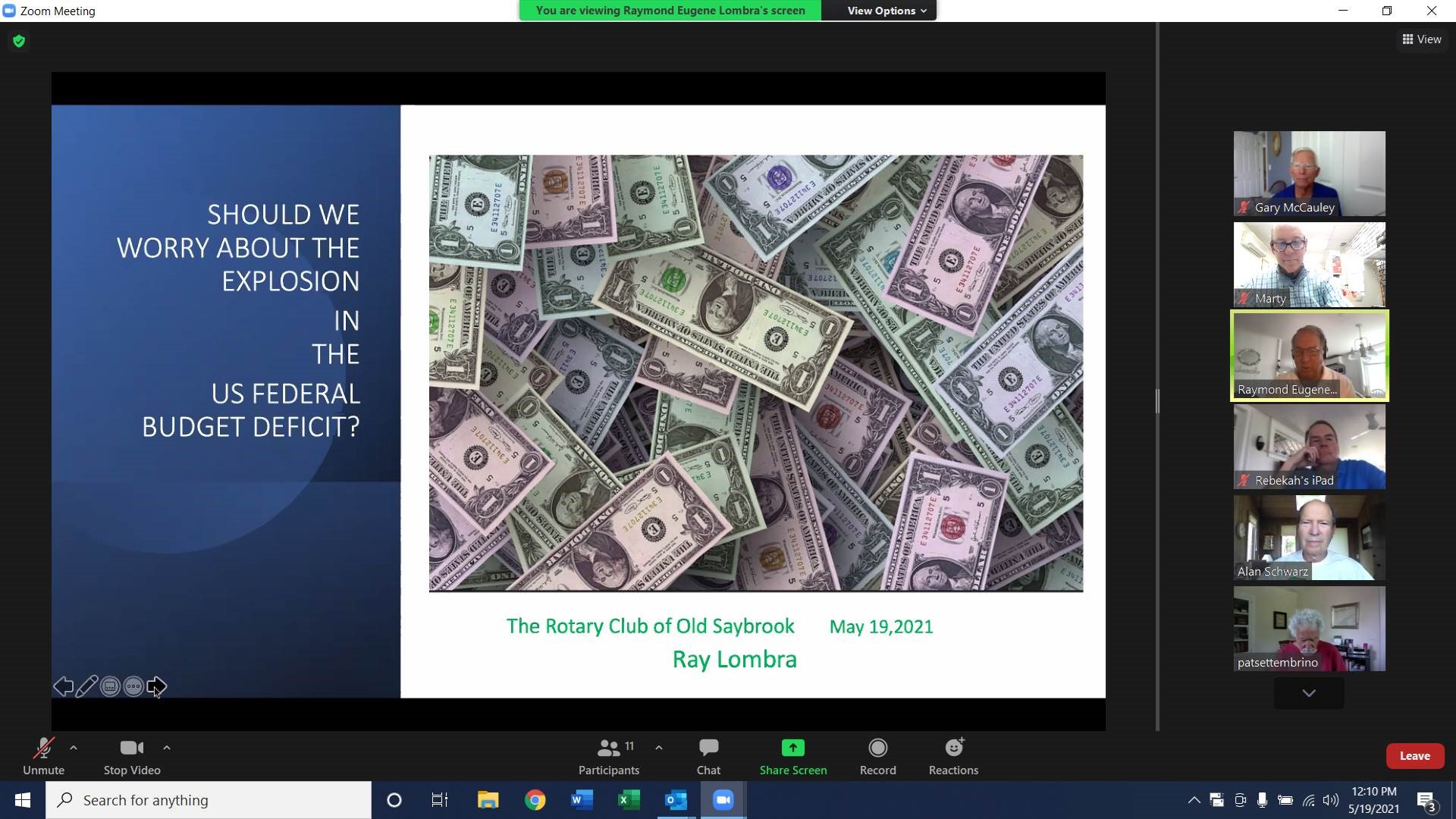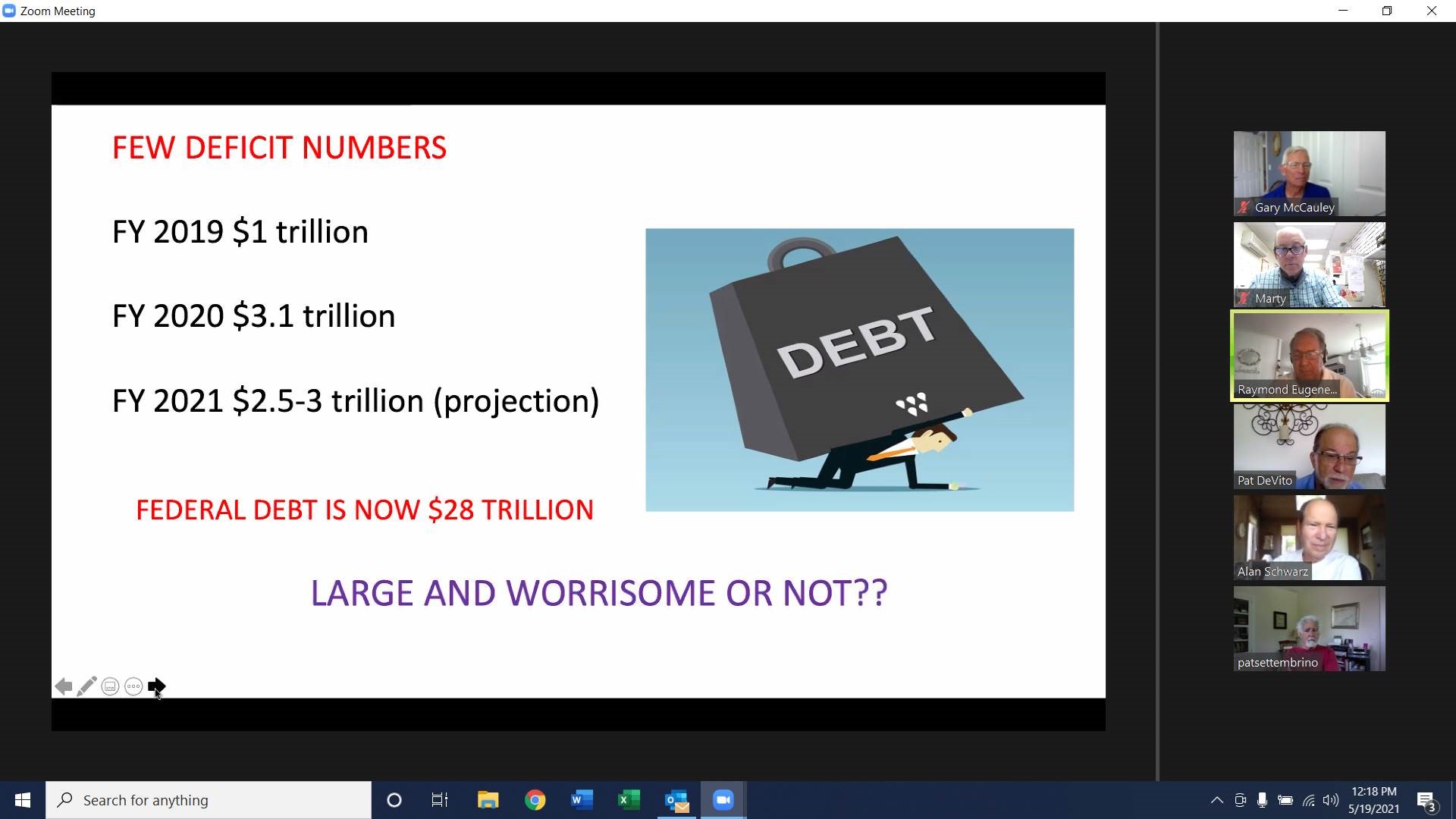Pledge/Prayer: President Gary McCauley
 |
 |
Speaker: Ray Lombra, is a graduate of Providence College and received his PhD from Penn State in 1971. He has written numerous published articles and written 7 books about international and monitary economics. His presentation today is titled, "Should we worry about the exposion in the US Federal Budget Deficit?"
Ray started out by defining some terms.
Taken from Ray's slides:
FEDERAL BUDGET DEFICIT = EXPENDITURES MINUS RECEIPTS
FEDERAL DEBT = SUM OF ALL PREVIOUS DEFICITS MINUS PREVIOUS SURPLUSES
EACH YEAR THE US TREASURY MUST FINANCE THE CURRENT DEFICIT, BY ISSUING NEW SECURITIES, AND REFINANCE THAT PART OF THE EXISTING DEBT WHICH MATURES
FEW FACTS:
- DEFICIT AND DEBT WERE ALREADY "LARGE" BEFORE PANDEMIC HIT
- PANDEMIC LED TO AUTOMATIC INCREASES IN THE DEFICIT AND TO NEW DISCRETIONARY ACTIONS TO CUSHION THE ACCOMPANYING ECONOMIC DOWNTURN
- AS A RESULT, THE DEFICIT AND THUS THE FEDERAL DEBT HAVE SOARED - AND MORE IS PROBABLY ON THE WAY
NEW DISCRETIONARY COVID-19 RELATED LEGISLATION: $5+ TRILLION PASSED IN TOTAL!!!
- March 2020: CARES ACT (Coronavirus Aid, Relief, and Economic Security Act); $2.3 trillion
- December 2021: OMNIBUS CONSOLIDATED APPROPRIATIONS ACT, including $900+ billion
of extensions of Covid relief
- March 2021: AMERICAN RESCUE PLAN ACT OF 2021: $1.9 trillion
The federal debt is now $28 trillion - large and worrisome or not? Ray posted graphs and charts that showed the deficit relative to GDP to put it into perspective. Since WWII, we have not run deficits relative to GDP like we are now. The federal debt as a percentage of GDP held by the public is projected to exceed that of post WWII going forward today. Federal Reserve holdings (US Treasuries+Mortgage-backed securities) are at an all time high - over $7 trillion. Foreign holdings have also ballooned. Japan is the largest holder of US debt with China not far behind. Foreign debt is more burdensome than whats owed to us. The stock market value is about twice what it was when Trump took office in 2016 - this is a fundamental disconnect with reality. Only 10-15% of spending is discretionary, the rest are things like military spending and medicare - not much can be cut. A long term plan for bringing the debt under control will take years over several administrations - a daunting task. Adjustments that are fair can be done such as basing social security on on one's entire income instead of just part of it but this is politically sensitive. Tax increases will happen. Large corporations have whole departments dedicated to paying as little tax as possible and they are good at it so there won't be much help there.
FINAL THOUGHTS / TENTATIVE TAKEAWAYS- Upward pressure on interest rates and inflation
- Bipartisan criticism of the Federal Reserve
- Financial market risks increasing
- Concerns about "fiscal responsibility", and the difficulties associated with cutting various components of mandatory spending and raising taxes, will be major stubling blocks for the Biden agenda detailed in his address to the congreass two weeks ago.
Following his presentation, Ray took questions.
We skipped happy bucks due to the length of the program.
Gary: Essex Savings Bank has a table in the lobby for organizations to display information. We will be doing that when our turn comes up.
Memorial Day: Marty gave details of the parade. Be at Stop & Shop for assembly by 9:30. Step off is 10:00 sharp. If it rains, the parade will be cancelled. There is a naval ceremony preceding the parade at 8:45 at Saybrook Point next to SPI. If it rains it will be held in the pavilion. Chaplain reads the Invocation. Try to make, very moving ceremony.
Golf Tournament: Charlie Renshaw is working with Brent and will be setting up committees.We need to get working on this now. Line up golfers, sponsors and get the word out. Registration forms will be available soon. We need 72 golfers (18 foursomes) to close the course to us.
Meeting schedule: Stay tuned - Pat Devito is working on going live again! JUNE: 1st meeting TBD, 2nd meeting SPI - Student of the Month, 3rd meeting on the Town Green (Pavilion if it rains), 4th meeting - ZOOM online
Dues: Look for the dues statement in the mail. Kathy Callinan is sending them out. $160 due on or before June 25. Ok to pay in 2 installments
Wine Tasting: Pat Settembrino brought in a new sponsor $500 level. Johnson Brunetti, Financial Retirement Solutions. John Donnelly is donating money for the shredding day even if he didn't make it.
Bill McLaughlin, missed the meeting due to confusion in time zones and his RV is down with an ignition problem!
Next week's program: UFO's, MUFON organization
md

